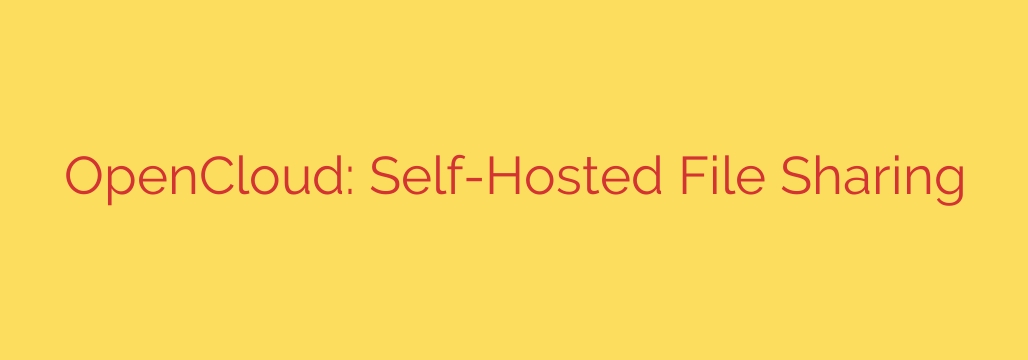
Regain Control of Your Digital Life with Self-Hosted File Sharing
In an era where our most valuable data—from family photos to sensitive business documents—lives in the cloud, the question of who truly controls it has never been more important. While services like Google Drive, Dropbox, and OneDrive offer incredible convenience, they come with a trade-off: your files reside on someone else’s servers, governed by their policies and vulnerable to their security practices.
What if there was a way to get all the benefits of cloud storage without sacrificing privacy and control? This is the promise of self-hosted file sharing, a powerful approach that puts you back in the driver’s seat of your digital life. By running your own private cloud, you create a secure, centralized hub for your data that you manage entirely.
What Exactly is a Self-Hosted Cloud?
Simply put, a self-hosted cloud is a file storage and synchronization system that you install and manage on your own hardware. This could be a dedicated server in your office, a spare computer at home, or even a low-cost single-board computer like a Raspberry Pi.
Instead of uploading your files to a third-party tech giant, you upload them to a server that you physically own and control. This fundamentally changes the dynamic of data ownership. You are no longer renting space; you own the entire digital property. This shift provides a level of security, privacy, and flexibility that public cloud services simply cannot match.
The Core Benefits of Owning Your Cloud
Choosing to self-host your files is about more than just privacy; it’s a strategic decision with several key advantages for both individuals and businesses.
- Unbreakable Privacy and Security: When you control the server, you control the security. Your data isn’t being scanned for marketing purposes or accessed by third-party employees. With proper setup, including end-to-end encryption, your files are accessible only to you and the people you explicitly authorize.
- Complete Data Sovereignty: Your files, your rules. You are never at risk of having your account suspended or your data deleted due to a violation of a service’s ever-changing terms and conditions. This is especially crucial for businesses that must comply with data residency regulations like GDPR.
- Freedom from Monthly Fees: Public cloud storage often follows a subscription model that becomes more expensive as your data grows. Self-hosting typically involves a one-time hardware cost. Over time, this can be significantly more cost-effective, especially for users with large storage needs.
- Limitless Customization and Control: Say goodbye to arbitrary file size limits, upload restrictions, and limited feature sets. With a self-hosted platform, you can configure storage limits, user permissions, and sharing policies exactly how you want. Many platforms are also extensible, allowing you to add features like calendars, contact management, and online document editing.
Essential Features of a Modern Private Cloud
Modern self-hosted file-sharing platforms have evolved into robust, user-friendly applications that rival the functionality of their commercial counterparts. When exploring a solution, look for these critical features:
- End-to-End Encryption (E2EE): This is the gold standard for security. It ensures that your files are encrypted on your device before they are ever sent to the server and can only be decrypted by the intended recipient.
- Granular User and Share Management: The ability to create multiple user accounts with specific permissions is essential. You should also be able to create public share links that are protected by passwords, have expiration dates, and limit upload/download permissions.
- Cross-Platform Accessibility: A seamless experience requires clients for all your devices. Look for a modern web interface for browsers, dedicated desktop sync clients for Windows, macOS, and Linux, and mobile apps for iOS and Android.
- File Versioning and Recovery: Accidents happen. A reliable system will automatically save previous versions of your files, allowing you to easily restore a document after an unwanted change or recover a file that was accidentally deleted.
- Activity Auditing and Monitoring: For security and administration, it’s vital to have a log of who accessed, changed, or shared files and when.
Actionable Security Tips for Your Self-Hosted Server
Running your own server means you are also responsible for its security. While this offers greater control, it requires diligence. Follow these best practices to keep your private cloud secure:
- Enforce Strong Authentication: Always use strong, unique passwords for all user accounts and enable Two-Factor Authentication (2FA) wherever possible. This adds a critical layer of security against unauthorized access.
- Keep Your Software Updated: Regularly update the file-sharing software, the server’s operating system, and any other applications running on it. Updates frequently contain patches for critical security vulnerabilities.
- Implement a Firewall: Configure a firewall to restrict access to your server, only allowing traffic on necessary ports.
- Automate Backups: Your data is only as safe as your last backup. Set up a regular, automated backup system that stores copies of your data in a separate, secure location.
- Use Encrypted Connections (HTTPS): Ensure all connections to your server are encrypted using an SSL/TLS certificate. This prevents anyone from snooping on the data as it travels between your device and the server.
By taking control of your data infrastructure, you are making a powerful statement about the importance of digital privacy and ownership. A self-hosted file-sharing solution provides a secure, flexible, and cost-effective alternative to mainstream cloud services, giving you the ultimate authority over your digital world.
Source: https://www.linuxlinks.com/opencloud-self-hosted-file-sharing/








